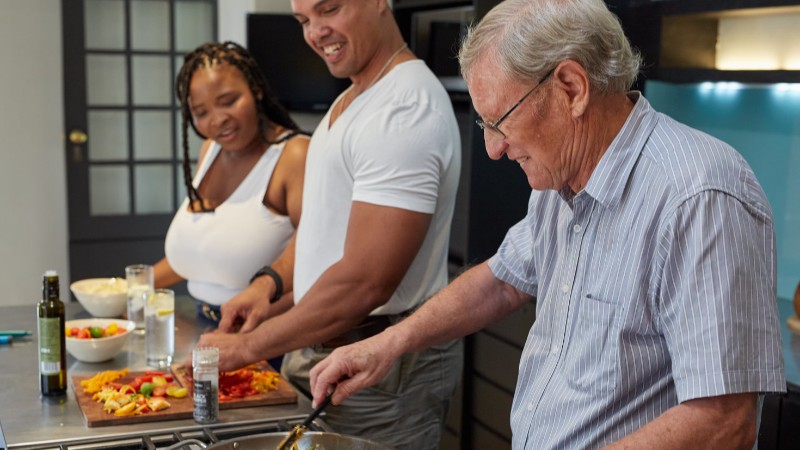Poor nutrition can weaken your immune system, leaving you more open to infections, muscle loss, and weaker bones. It also affects your mind, leading to memory issues and mental decline.
Chronic conditions like heart disease, diabetes, and high blood pressure can get worse without the right nutrients.
The good news? A balanced diet can help you feel stronger, think clearer, and enjoy a healthier, happier life. This article discusses the importance of nutrition and exercise for senior health, offering key tips and strategies for healthy eating and staying active.
Nutritional recommendations
Nutrient-rich whole foods like fruits, vegetables, whole grains, lean proteins, and healthy fats keep the body strong. These foods support digestion, boost energy, and improve brain function.
For example, whole grains like brown rice, quinoa, and whole wheat bread provide fiber that keeps you full and supports healthy digestion. Lean proteins, such as chicken, fish, and beans, help maintain muscle health, while healthy fats from nuts, seeds, avocados, and olive oil are great for your heart.
Drinking enough water—about eight glasses a day—is also important. Staying hydrated helps your body function properly and supports overall health.
Supplements and meal planning
Sometimes, even the best diet can’t provide everything you need. Supplements can help fill the gaps.
Vitamin D is important for bone health and mood, Omega-3 fatty acids support heart and brain health, and calcium with vitamin K can strengthen bones.
Still, it’s always best to talk to your doctor before taking any supplements to make sure they’re right for you.
For many seniors, meal planning and cooking can be challenging. Working with a dietitian can help you create a simple, customized meal plan that meets your needs.
Exploring simple recipes that use whole foods can make cooking less intimidating. Eating well is about taking care of our overall health, and it’s okay to seek help to make it easier.
Exercise
Exercise is just as crucial as eating well, especially for seniors, who often spend much of their day sitting. Studies show that older adults spend over 60% of their waking time sedentary, with many sitting for hours watching TV or in front of screens.
Walking, swimming, and light stretching can improve flexibility and mobility and help with weight management, making daily activities easier.
Strength training exercises, like lifting light dumbbells or using resistance bands, can help maintain muscle mass and bone strength. It’s never too late to start; even small amounts of daily activity can make a big difference.
Incorporating both aerobic and strength exercises into your routine can help you maintain a healthy weight, reduce the risk of chronic diseases, and improve mood and mental function.
Aerobic exercises, like brisk walking, cycling, or dancing, improve cardiovascular health and boost energy levels. Meanwhile, balance exercises, such as yoga or tai chi, can help avoid the risk of falls.
Conclusion
Good nutrition and regular exercise work hand-in-hand to improve your health, manage chronic conditions, and enhance your quality of life. Before making significant changes to your diet, exercise, or supplement routine, it’s always best to consult with healthcare professionals.
As important as food and diet, staying socially connected is key to good mental health. Spend time with friends, join groups, or enjoy social activities. Keep your mind sharp with reading, puzzles, or learning something new.
Remember, your health and well-being are worth the effort, and every step you take toward a healthier lifestyle can help you stay strong, active, and happy as you age.














